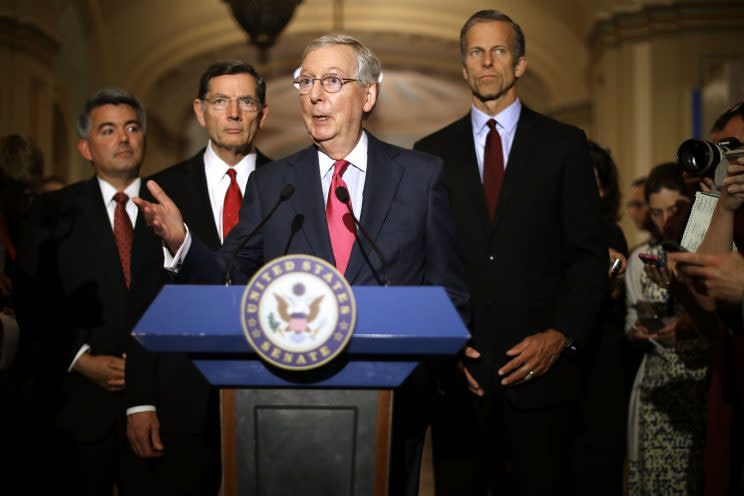CBO score could roil Senate health care negotiations

WASHINGTON — The Congressional Budget Office will release its prediction of the effects of the House-passed health care overhaul Wednesday afternoon, potentially stirring up more dissent among Senate Republicans who have spent much of this month attempting to hash out their own health care deal.
The CBO will likely deliver a similar verdict for the American Health Care Act (AHCA) as it did for an earlier version of the House bill, which the office said would result in 24 million fewer Americans having health care coverage and $150 billion in deficit reduction over 10 years compared with Obamacare.
That uninsured figure fueled a wave of outrage at town halls across the country in March and April, and having it back in the headlines again could be toxic for the delicate negotiations on the subject in the Senate. Democrats are likely to wield the CBO score as a potent political weapon against Republicans, with one GOP group already launching a $2 million ad buy coinciding with the CBO score release this week to defend vulnerable House Republicans from those attacks. Only 21 percent of Americans support the AHCA, according to one recent poll, and a CBO score showing millions losing coverage is also unlikely to boost the plan’s overall popularity.
“Theoretically, I can see it scaring off lots of people,” said Liz Mair, a Republican political operative, adding that GOP moderates as well as fiscal hawks could be spooked by the score.
Senate Republicans have been meeting three times a week to hammer out their own version of legislation designed to repeal and replace Obamacare, with Senate Majority Leader Mitch McConnell, R-Ky., saying on Tuesday he believes they’ll move on a bill in the “near future.” But the task is formidable, since McConnell needs at least 50 of the Senate’s 52 Republicans — moderates and conservatives — to agree on the politically risky plan.

Wednesday’s CBO score will underscore that political risk, since health experts say the current version of the House bill will likely show millions of Americans losing coverage under the AHCA and result in less cost savings than the original House proposal.
The bill the House passed was changed at the last minute to let states seek waivers that would allow insurance companies to sell policies that don’t include some health benefits like maternity care and to charge more for people with preexisting health conditions. House leadership added $8 billion to the bill to fund high-risk pools for people with preexisting conditions, as a response to critics who said the legislation would price people with preexisting conditions out of the market.
“I could see the number of uninsured decreasing or increasing very slightly, but I think it’s going to look a lot like the last time except for possibly less deficit reduction,” predicted Timothy Jost, a health care expert and emeritus professor at Washington and Lee University School of Law.
Avik Roy, a conservative health care policy analyst, said he believed the bill’s uninsured figure would be similar to the previous score, while the cost of premiums over the mid to long-term would go down more than in the previous version given the new bill’s waivers to states which could bring more healthy people into the market.
If the CBO shows 20 million plus Americans losing insurance with significantly less savings than the earlier version of the bill, that could end up spooking both GOP moderates and conservatives in the Senate. Though the Senate is working on its own bill, so far lawmakers believe they’ll largely keep the AHCA’s Medicaid structure and tax credit model.
Mair predicted Sens. Rand Paul, R-Ky., Mike Lee, R-Utah, Ted Cruz, R-Texas, Jeff Flake, R-Ariz., and Ben Sasse, R-Neb., would all likely object to lower predicted deficit savings in the House bill. (Lee and Cruz are part of the 13-person Senate working group tackling the health care issue.)

The CBO score also could lead some Republicans to decide they want to keep more of Obamacare’s taxes in the Senate bill in order to fund higher tax credits for people who want to buy insurance, Sen. Rand Paul, R-Ky., told Yahoo News.
“I think what’s going to happen is there’s probably a dozen Republicans in the Senate who want more subsidies for people, they want to keep more of the Obamacare subsidies,” he said. “But I think they’re going to find out when the CBO scores it that there’s not much money they have to play with and that they would have to actually keep some of the Obamacare taxes.”
If Republicans go that route, they could lose Senate conservatives, like Paul, who were pushing for a full repeal of Obamacare.
Republican leadership will likely dismiss any furor over the CBO score Wednesday as irrelevant, since they are crafting their own bill that will be different from the AHCA. But lawmakers say they are likely keeping many of the key aspects of the House’s bill — including its Medicaid cuts and tax credit structure to purchase insurance on the individual market.
“When we get that score, we’ll use that as a backdrop against which to plan some of our Senate options,” said Sen. John Thune, R-S.D. “It’s instructive because there’s some things we’ll build on that the House did.”
The Senate version of health care reform also must achieve the same deficit reduction as the House version in order for it to pass by reconciliation, a procedure that allows lawmakers to push through the bill on a bare majority without needing to attract any Democratic votes.
Meanwhile, Democrats are likely to seize upon the CBO score to remind the base that Republicans are attempting to push through a law that is unpopular in the polls and could result in millions of Americans losing health care.
“We’ll wait to see what the score is, but what we know is there’s a basic architecture here, which is hundreds of billions of dollars in cuts in programs for the vulnerable, hundreds of billions of dollars in tax breaks for those at the top, and I think what this means for this country is a tsunami of pain and misfortune,” said Sen. Ron Wyden, D-Ore.
Read more from Yahoo News:
‘The most horrible feeling’: Mother of missing Manchester concertgoer describes chaos of attack
Pentagon report shows Flynn misled investigators about Russia trip
‘Operation Git-Meow’: The mission to save Gitmo’s feral cats
As Iraqi forces close in on ISIS and Mosul, civilians are still caught in the crossfire
Photos: Deadly blast at Ariana Grande concert in Manchester, England


